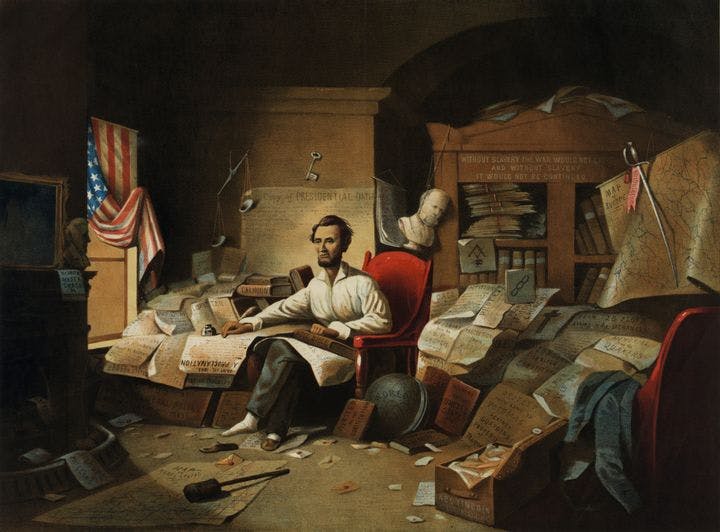Winter 2013
Greatness and the mere politician
– The Wilson Quarterly
One thing that made Lincoln unique: his sometimes disorderly leadership style.
In his first major political speech, “The Perpetuation of Our Political Institutions,” a young Abraham Lincoln lamented the “mobocratic spirit” and lynch mobs of the Jacksonian era, then in full swing. Americans, he said, needed to rekindle their “reverence for the Constitution and laws.” Lincoln gave the speech in 1838, at age 28, in Springfield, Illinois.
A quarter-century later, as president of the United States, Lincoln stayed true to his own counsel, embodying what Yale political science professor Steven B. Smith calls the constitutional style of leadership. The constitutional leader, Smith says, preserves constitutional order while promoting liberty and change. It’s a balancing act that requires equal parts boldness and restraint. Lincoln cast the challenge of this style of leadership in the form of a question included in an 1861 message to Congress: “Must a government, of necessity, be too strong for the liberties of its own people, or too weak to maintain its own existence?”
Juggling these conflicting priorities sets constitutional leadership apart from other leadership types, Smith says, focusing on three in particular.
The first, which the 20th century would label “realpolitik,” was enunciated by Niccolò Machiavelli in The Prince (1513): Leaders aspiring to greatness should let the ends justify the means.
Charismatic leadership, described by the German sociologist Max Weber (1864–1920), is another type. Charismatic leaders have a passionate devotion to a cause that, in turn, inspires devotion in others, but such leaders are not constrained by any “fixed principles of action.”
Progressive leaders — Woodrow Wilson, for example — believe that all problems of governance can be solved by scientific or technical means. The leader’s mission is to spearhead change. If the Constitution needs to be reinterpreted to accommodate this process, so be it.
Constitutional leadership incorporates elements of these styles while avoiding one major pitfall, according to Smith. None of the three types pay much heed to preserving the institutional bases of governance.
Lincoln “argued that preserving and maintaining institutions may be more difficult than founding them,” Smith writes. Constitutional leaders will constantly face the challenge of thwarting Machiavellian competitors hungry for the glory that comes with creating a new order. To meet this challenge, Lincoln prescribed political inoculation: “Let reverence for the laws, be breathed by every American mother, to the lisping babe, that prattles on her lap,” he proclaimed in his 1838 speech. “Let it become the political religion of the nation.”
Yet all constitutional leaders must also find a way to move forward. For Lincoln, this meant a return to the Republic’s fundamentals: equality for all and consent of the governed. He seized on the Declaration of Independence for the eloquence with which it expressed inviolable natural laws. In 1861 he avowed that “I have never had a feeling politically that did not spring from the sentiments embodied in the Declaration.” The commitment to equality articulated in the document, for example, informed Lincoln’s opposition to slavery.
Lincoln honored the Constitution even in the breach. During the Civil War he suspended habeas corpus, cracked down on antiwar demonstrators, and issued the Emancipation Proclamation. All these steps exceeded his explicit constitutional powers. But in each instance, Lincoln was careful to provide a constitutional basis for his action: his duty as commander in chief to “preserve, protect, and defend” the Constitution.
Lincoln recognized that the Constitution imposed clear limits. For instance, as his hopes for reelection dimmed in 1864, some suggested delaying the balloting. There was a war on; a vote could jeopardize the Union. Lincoln demurred, vowing to “co-operate with the President elect, as to save the Union between the election and the inauguration.”
Lincoln was no superman. Smith quotes political scientist Bernard Crick, who described the 16th president as “an indifferent administrator, disorderly, inconsistent, and even slothful.” But Smith concludes, “It is in this possibility of the mere politician serving as a great leader in times of challenge — a paradox made possible by our constitutional forms — that the hope of our republic rests.”
THE SOURCE: “Lincoln’s Constitutional Leadership” by Steven B. Smith. National Affairs, Fall 2012.
Image courtesy of Wikimedia Commons
